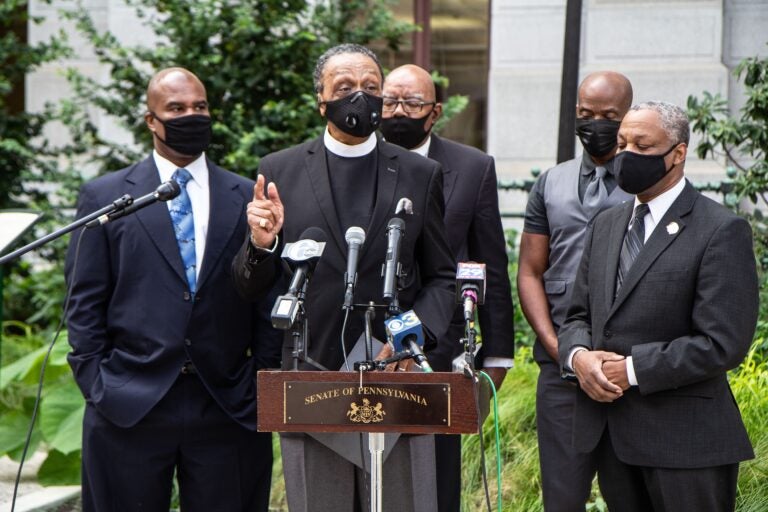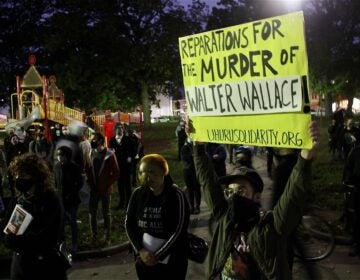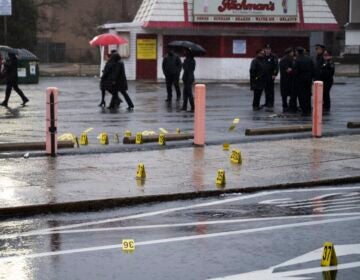Wallace killing is ‘Minneapolis all over again’ for West Philly, says Black Clergy president
Morning Edition host Jennifer Lynn talks with Rev. Robert Collier about how West Philly is also hurting from the police shooting death of Walter Wallace Jr.
Listen 6:36
Reverend Robert Collier, president of the Philadelphia Black Clergy (center), speaks at a press conference in September 2020. (Kimberly Paynter/WHYY)
This is a difficult time in Philadelphia and across the country as we witness the death of another Black man at the hands of police.
Walter Wallace Jr., 27, was fatally shot by police outside his family’s Cobbs Creek home on Monday afternoon. His mother said she called 911 asking for an ambulance to assist Wallace during a mental health crisis. Two officers who responded to the scene each fired at least seven rounds at Wallace, who was reportedly holding a knife.
In the aftermath, there have been protests, marches and some looting, and the city’s Black Clergy is among those who are asking, “Why did this happen?”
The Rev. Robert Collier is president of the Black Clergy of Philadelphia and Vicinity. He’s a pastor of Galilee Baptist Church in Roxborough. He spoke with Morning Edition host Jennifer Lynn about Wallace’s death and how West Philly is coping with the loss.
___
Good morning, Reverend.
Good morning, Jennifer.
Reverend, is the death of Walter Wallace Jr. Philadelphia’s Minneapolis, that is to say, our version of the death of George Floyd at the hands of police?
Yes, it seems like it’s a repeat. It seems like it is the same act at a different scene, different state, different town. But it’s Minneapolis all over again for us.
Sir, upon learning about this, did you think that there was a better way to stop Walter Wallace Jr. as he approached police with a knife Monday besides shooting him?
Yeah, we believe so. We believe you have two armed law enforcement officers and you have one man with a knife; we believe that their training should be such that they could have apprehended him, contained him and arrested him without firing a shot.
And I have heard Black Philadelphians say that they think police are less likely to talk down a Black person than a white person when they feel that person is aggressive. Do you agree?
Well, I agree to the extent because I’ve seen video on TV of where a white man in a similar situation was apprehended unharmed. And when it happens to a Black man, he’s killed, so that’s the only way I can compare. I’ve seen it happen when it was non-Black, and then I’ve seen it when it happens when it’s Black. But when it’s black, they usually end up dead.
Philadelphia Black Clergy have been working with the city to work out better policing strategies. Do you think there’s anything in your planning with the city that would have helped save the life of Walter Wallace Jr.?
Yes, we have medical people. We have people in our organization who have mental health training. We have people in our organization who were former police officers. And we believe that there are some strategies that could be used. And that’s why we’re calling for a meeting with Mayor Kenney and Commissioner Outlaw.
And you think that if these things — have they been implemented, have you had a chance to practice these things?
We believe that if they had been implemented in practice, that more lives could be saved. And we want to intervene now before any more life is lost because we think there needs to be a different way of policing, especially in the African American community.
Now, in reaction to the death of Walter Wallace Jr., there have been protests. There have been some peaceful marches, also a lot of looting and looting in West Philadelphia, also in parts of Port Richmond and other neighborhoods. How is looting an answer to injustice in our city?
We do not condone any looting. We believe that we believe in peaceful demonstration. We understand the anguish. We understand people are hurt. But looting and destroying your neighborhood and your community will not solve anything. So we abhor the idea of looting and violent demonstrations.
And pastor, there’s a lot of anger, of course, and frustration even about how police handled the large protests on Monday night that escalated into a lot of arrests. Some vandalism left 30 police officers injured Monday night. Tell us about that anger.
We understand the anger because it happens too often. I’m angry, members are angry, but we are clergy, we are leaders. We have to channel our anger into positive reinforcement of advocating peace, advocating calm, and advocating for those involved to sit down and strategize and come up with solutions to the problem. Being angry and reaching out and looting and doing negative things would not help the situation at all. It calls for resolution within negotiation and sitting down and talking through our problems.
And sir, you were in tears yesterday. Our own reporter Peter Crimmins was following the Black Clergy-organized gathering and marching together in unity yesterday. Why the tears for you yesterday?
I have two sons, and I have a grandson. And I would not want that to happen to any of them. So I sympathize and empathize with the Wallace family. And I don’t ever want to see any more of this happening, and that’s why we must come to a point where we must sit down and find a better way of doing things.
And the community at large wants answers, of course, and justice. How do you and your role help meet that need?
What we’re doing, we’re meeting with the community, and we want to facilitate the meeting of the minds. And that’s why we want to — we’ve met with elected officials. So we want to meet now with the city administration. We’ve already talked with Larry Krasner, the DA. We’ve been talking with him. So that’s not a problem. We want to meet with all the stakeholders. We want to sit down, and we want to diffuse the anger. And we want to diffuse all the negative kinds of behavior and start doing things that would cause our people to have an optimistic outlook when we find changes in policy, changes in the way they do things, and our people are willing to listen to what we have to say.
Thank you so much for your time this morning.
Thank you so much. We really appreciate it.
Absolutely.
WHYY is your source for fact-based, in-depth journalism and information. As a nonprofit organization, we rely on financial support from readers like you. Please give today.







